|
In 1987 the
broad acceptation of speed and thrash metal directly led to an
extensive story about metal drummers. The bands that were thrown
a light upon in the Swkrant #22 heavy metal special haven't done
too badly since. Motörhead is often quoted as one of the most
important founders of speed and thrash. Metallica, Megadeth, and
Anthrax in the meantime kicked it to absolute world fame! Metal
Church and Flotsam & Jetsam had their ups and downs, but are
still assured of a loyal audience. Only Laaz Rockit has dropped
out of the picture.
The unexpected success of speed metal, not exactly the most commercial
kind of pop music, made record companies keep their ears extended
on the ground of the underground and every band from which they
thought would link up with the taste of the Headbanger, that "Oh
so easy to buy" group, was contracted. It was just a matter
of (very little) time before a part of this audience and quite
a number of musicians decided that speed metal was not enough;
not hard enough, fast enough, extreme enough, or virtuoso enough.....
COZY
POWELL
Ever since he
was a part of Ritchie Blackmore's Rainbow he always played in
the forward-line, jumping from band to band as a full time session
drummer. However, right now Cozy Powell has stuck it out for three
years already around guitarist Tony Iommi with the legendary Black
Sabbath. Especially Sabbath's latest release "Tyr" is
worth the effort of listening to. You hear a band with its own
well tried sound, certainly not resting on their laurels.
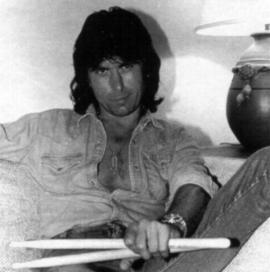 
"I'm, let me
think, around 3 years a part of Black Sabbath", he tells.
"Some find it quite long for me, yet I am not the only one
who's been a part of this many bands. Take a look at Carmine,
at Tommy Aldridge. For some reason it's more striking with me.
I haven't always been that lucky with other bands, but I'm very
happy in Sabbath. I can play my own way completely. Nobody is
nagging me about how or what I should be playing. This happened
to me before. The last time with Gary Moore. He wanted me to play
every note the same way that I did on the album, so I said: "Look
Gary, you could just as easily tie me up! I am not telling you
how to play your guitar either", you know what I mean? That
was an exception. Mostly I am being asked for who I am and won't
have to put up with this kind of nagging. Especially on tour,
you must play the music you really like to play. In the studio
I am willing to make a fool of myself and play something I am
not behind 100%, but with an audience of 5,000 people I don't.
After all, what they heard can never be erased....."
When you joined Sabbath you were having conditonal troubles....
"I am 43 now and
had to lift some weights, did some running, but above all I played
a lot. Touring is the best fitness training. After playing an
hour and a half with Sabbath, well you're done. Your shoulders,
your arms, your legs. Everything works. Everything is moving and
just a bit more than with the average jazz drummer. Six shows
a week keep me quite fit! I could use some more sleep, but that
has to do with other.... activities, uh.... that come along with
these kind of tours."
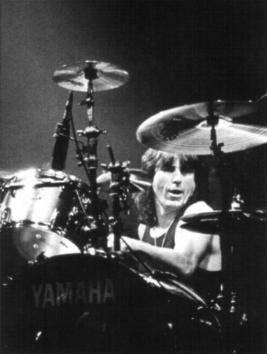 
TEAM WORK
Sabbath plays a lot of
classic rock songs. Are you attached to how your predecessors
played those songs?
"I don't have any
problem at all to play somebody elses stuff. When I was playing,
for a short period, with Emerson, Lake & Powell ('85-'86),
I did everything Carl did but different. A bit more heavy probably
and less freaky. The classic Sabbath songs are pretty easy for
me as they are. I always liked Bill Ward, the original drummer,
and I just add a little of me. Tony Iommi's guitar sound and style
are defining Sabbath's sound for a major part, so that doesn't
change. Mostly he comes with a theme, I put a solid rhythm underneath
it and then we jam for a while, until we have something that sounds
good. Or I put on a beat and he plays over it. Teamwork. It's
better than one person writing everything by himself because it
gets boring. Teamwork is the secret of every succesful band. Drummers
need to have their say in what happens. I co-produce the albums,
I get a solid drum sound, and I am not being pushed away in the
mix. That's the way I can work. There are drummers who take years
to develop their sound and style. Then along comes a producer
who doesn't like it and the drummer is gone. Those guys that are
able to make a 32" bass drum sound like an 18". Do you
recognize that? It happened with me in Whitesnake."
Powell names Buddy Rich
and Louie Bellson as influences but says to have learned the most
from the 60's pop drummers like Brian Bennett (Shadows) and Bobby
Elliot (The Hollies). Once he cooly stated in "Modern Drummer"
(11-'84); "I am not a "tasteful" drummer".
Besides he always says not to believe in reading.
"About reading:
I rather play on instinct", he says shrugging, "and
when I play a solo it has to be an explosive whole that you'll
never forget. Technically I am at an absolute minimum level, but
I just don't give the game away. It hasn't got that much to do
with playing; you just have to pull out all the stops and use
all your tricks."
HEAVIER
Has there been a lot
changed in the studio, compared to let's say, 15 years ago?
"Not really, John
Bohnham had the best drum sound ever, a natural tone, which had
a lot to do with how he hit. I almost play the same way; it matters
where you place your mics. I don't use all too many effects, just
a bit of resonance to give the sound a bit more body. And how
I tune my drums matters a lot. You have to tune them right and
hit them hard. Ah...."
Matter of experience?
"When you hit as
hard as I do you must not put your heads too tight, otherwise
you'll get a very silly sound. I put on a new head, tighten it
a little, give every bolt an extra turn, and then I tune it until
I hear what I want to hear. But I hit hard with very thick sticks.
I will give you some, so you know what I mean."
The Cozy Powell Model
Yamaha sticks are 2,5 cm longer, 4 mm thicker, and 40 gr heavier
(each...) than the heaviest standard stick, the 2B; almost a forest.
"The Yamaha folks
once came on stage to measure my old Ludwig kit. Great people.
They still make special kits for me, like the one I'm using right
now, with Gilt hardware. Don't ask me about seizes though. I know
my toms have 2 extra inches, just like the bass drum. It's 26"x
20". Yamaha always listened to me when I had comments on
the standards or pedals. When something stays whole under my hands
then it's strong enough.That's something they really understand
in Japan. I'm sort of a test case for them. I've played Paiste
cymbals for years now. Not the Signature; they just don't sound
good with the sticks I use. The 3000 series is perfect for what
I do. Why play something else then?!"
During the last Sabbath
tour Powell used 5 crashes, actually almost sounding, after finding
their way through the gigantic sound system, alike. The rivels
in his 18"and 20" Paiste 3000 crashes are not marking
effectful. The very big Paiste gong behind him is completing the
stereotype image of the English rock drummer in the year Powell.
IAN
PAICE
Next to Black
Sabbath another band that escaped by the skin of their teeth was
Deep Purple. After a reunion with the succesful line-up of Gillan,Blackmore,Lord,Glover,
and Paice, the group is living now without Gillan, but Ian Paice
stays in his place as solid as a rock. The drummer who made "Made
in Japan" and songs like "Fireball" and "Speed
King", into unforgettable pieces of rock history wants to
look back on his youth with pleasure.
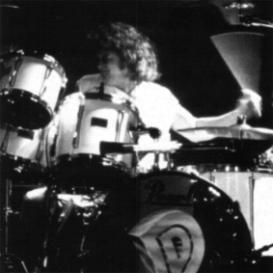 
"A drum kit looked cool
and drumming seemed to be an easy thing to do", is his
first answer about his choice for the drums as an instrument to
play on. "The first urge for drumming I felt around
the age of 10-12. I used to grab my mothers's knitting needles
and play with them on everything that I could find. It became
obvious that I had a talent very soon, because a lot of stuff
I only had to hear, not even see, and I could play it. On my 15th
birthday my father gave me a drum kit. He was a professional piano
player for quite some time and my parents supported me a lot instead
of telling me to look for a "real" job."
Paice does his first
performances with dance orchestras, mainly playing foxtrot and
waltzes.
"And getting drunk
afterwards with my dad, beautiful!"
Like Cozy Powell he played
in his first professional band at the age of 17, and he also went
to Hamburg (Germany/YK) in the mid-sixties. There he ran across
Ritchie Blackmore, whom not much later formed Deep Purple. The
rest of the story is history....
Except from his father, Paice dit not get music lessons, which
had nothing to do with not wanting to, but there were simply no
drum teachers available around Oxford, where he lived at that
time. Yet on the video of the concert that Deep Purple did together
with the Royal Philharmonic Orchestra in 1969 Paice is reading
music.
"Oh, but that was
a joke, I mean on the first line there was something like: wait
about 3 minutes, then give 3 HARD strikes, first in rock &
roll tempo, pay attention to the director for the stop, STOP,
etc.... Quite a nice experience. All those violinists behind me
read this of course and they all went: "this is never gonna
work", but it did. Those lines were as much sheet music for
me as theirs was for them."
SAD
The Deep Purple songs
arise like Black Sabbath's out of jam sessions in the rehearsal
room. They play with a theme which slowly grows into a song.
"The problem with
this is that you really only get to know a song by playing it
on stage. Before it's too young. The songs from "Slaves and
Masters" like we played them on the last tour are totally
different from those on the album. Better, mainly. They have something
complete now, a freedom which is not to be found on the album.
During recordings we're not quite sure of what we want to tell.
Nobody in the band says: "here's a song and this is what
it should sound like". It's a process of growth like life
itself. In the beginning it's very confusing and not clear at
all. In former days things went different; we played songs live
before they got recorded. In those days we never stopped touring
so every idea was worked out on the stage and recorded after a
gig or 20-30. Now we make an album and tour afterwards etc.....
I've never had much fun working in a studio. A crowd makes me
much more enthusiastic than a tape. Something goes wrong live?
Once you've noticed it it's already gone. In the studio it's a
sign to do it over again, which is not very good for spontaneity."
Ginger Baker and Bernard
Purdie have been influences on Paice's style, but Carmine Appice
was his big example among the rock drummers. Furthermore Ian listened
a lot to jazz drummers and played along with the dance albums
of his father's. "Which helped me develop a quite varied
style."
Asking him about recent
musical developements Paice fancies Jason Bonham to be a good
young drummer.
"Very powerful,
like the "Living Colour" guy, what's his name again?
By the way, that whole band is great. I don't follow everything
though. Sometimes I hear an album I like, or just one song. I'm
not that fanatical. It's like drumming, I do it because I enjoy
it; it's not an obsession. When you become too serious about your
music you lose the essence. When you're young you make music for
fun and I think that's always how it should be."
NOTHING FOR ME
Powell exchanged Ludwig
for Yamaha and Paice for Pearl.
"A 26" bass
drum and a 6 and ˝" free floating snare are the only two
indispensable drums. A drum kit actually exists out of 4 drums.
Everything you add must really be seen as extra, at least that
counts for most of us mortals. It's different of course when your
name is Simon Phillips. He plays everything all the time and with
every hand that's available. Wonderful. I watch him play, but
I have no idea how he does it, and if I could do what he can I
wouldn't play that way because it's just not my style. The same
goes for Mark Brzezichi. His polyrhythm's are amazing, but nothing
for me......"
Between the Paiste cymbals
the 2002 ride strikes the most, still the same as to be heard
on "Made in Japan". "A wonderful cymbal."
"There's really nothing
you should not play, grab everything, you'll learn to make distinctions
between. Furthermore it's of course beautiful if you can play
all rudiments, but just a few are really of importance: the single
and double paradiddles and a good two beat roll, a five beat roll
and take care that your single strokes are steady. When you can
play those rudiments in different speeds and feels, you have enough
baggage to be able to play all nowadays music. Also the placing
of your bass drum hits are very important. By placing them correct
you can fool people about your speed. Search a good teacher and
play with him until you know what you wanted to know and not any
longer, because you will end up sounding like him, which leaves
you no future. Sound like yourself. Personality is the secret
of every great musician."
GENE HOGLAN
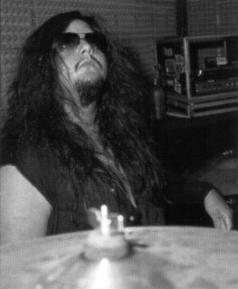 
We won't blame the gentlemen
Powell and Paice that they are no longer on top of every developement
in hard rock and heavy metal. However three drummers that would
compel admiration from the old hands as well as from the average
Swkrant reader immediately are Gene Hoglan of Dark Angel, Mike
Browning of Nocturnus, and Rick Colaluca of Watchtower, respectively
from San Fransisco, Tampa (Florida), and Austin (Texas). Listen
to Dark Angel's last CD "Time Does Not Heal" and hear
how Hoglan effortlessly whips up his band members in deep, rhythmical,
very elaborated songs for which he himself wrote many of the guitar
parts and that are supplied with not quite decent lyrics also
by him. His double bass drum play isn't second to Deen Castronova's,
his up tempo rhythms lean nicely in front of the beat and the
combination of suppleness and inventiveness speaking from his
breaks are the incontrovertible proof of the indepencence of his
hands and feet.
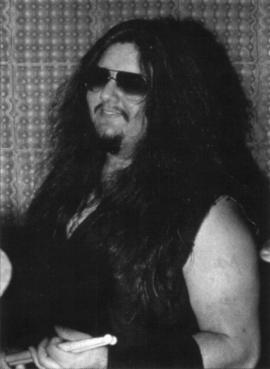 
"Drums don't have much
soul", Hoglan explains. "You have to put in
a lot of time and energy to get soul, fire and passion out of
your drum kit. That's why I never stagnate in my development.
I always try to get out more than I did before. I play left-handed
on a right-hand kit, but as we tour with a support act and I have
to share my kit with their drummer I play right-handed on a right-hand
kit because it takes less time rebuilding in the break. I do everything
to prevent myself from getting bored and I like making a show
out of it. When things are easy for you, must you go watch the
ceiling as a drummer? So I am head banging like an idiot, I catch
every cymbal I can, I juggle with my sticks... Since my childhood
I've realized I'm not really a drummer, but I just like to hit
on things. Hard and a lot. Guitar playing certainly helped me
with drumming. I always come up with those fucking satanic schemes....
And in Dark Angel it's always been this way: the bass guitar plays
along with the rhythm guitar. So whenever I think of something
weird on guitar, a strange rhythmical beat, I want to be able
to play along with it with my feet. I assure you that's a big
help with drumming. Terry Bozzio quite influenced me with those
stuttering, stacata bass drum parts. We put over a guitar riff
in E and ready..... Something else I've learned from playing the
guitar is the importance of moderating your speed. On our first
album there are beautiful riffs, but no-one ever heard them because
we played them too fast.
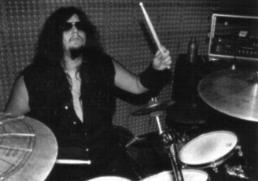 
GROOVE AND POWER
Kiss, Angel, and Queen
were favorites of the young Gene. From Deep Purple he quotes the
song "Fireball" as an example of what you can do with
your bass drum foot.
"Later on there
are Rush (my idols around age 12) and Yes. Bonham never appealed
to me a lot, although I once was called the Bonham of speed metal.
I appreciate Led Zeppelin more now, but as a child I hated that
band just because of the fact that every simple soul in my environs
was a Zeppelin fan. No, Peart was my man, and Tommy Aldridge.
Bozzio with Zappa and UK. I was just 14 years when I learned to
play "Presto and Vivace" from UK's live album. I was
as happy as a king.... Then there's Steve Gadd for his Al DiMeola
stuff, "Elegant Gypsy", "Casino", those albums.
I steal a lot of him and Bozzio. Deen Castronovo is a great metal
drummer. He's got a good sticking and plays as free with his feet
as with his hands. I'm very happy just sitting on the couch at
home playing video games. I never really studied on the drums,
I never had a teacher. Fuck the drums, give me a guitar, you know.
All my drum play I made myself familiar with through osmosis.
I absorb all kinds of styles and spit them out again in the Gene
Hoglan style. Band rehearsals and touring are enough for me. The
gig as a rehearsal: throw a linear pattern into a speed metal
song. Very interesting, hahahaha. You are gonna attract attention
immidiately, I assure you. The words thrash metal and soul are
seldomly named together. Thrash metal is about negative emotions
such as hate, pain, suffering, oppression.... We try to bring
out those emotions in our music as much as possible live and I
try to add some soul here and there, but our music is based on
power not on groove. So my play will never have the impact like
that of Gadd of Sonny Emory (my absolute hero at this moment).
Creating a groove in a thrash metal enviroment isn't the easiest
thing to do, but damn, having four body parts you can at least
try. I don't care whether my heroes will ever hear me or not.
People are very fast judging about thrash metal and I admit immediately
that there are a lot of thrash metal drummers playing like a piece
of shit. I hope I will never be one of them. Hey, nice quote?
Gene Hoglan said: "I shall try not to become a piece of shit."
MIKE BROWNING
Nocturnus got a general
support with their debut album "The Key" because of
the integration of keyboards into, mainly vomitting guitars and
vocals dominated, death metal. Not that this all of a sudden produced
sweet melodies. Heavy, almost industrial tints were added to the
complex, for the unsuspecting listener, almost inscrutable wall
of noise. Mike Browning, who used to be the drummer of Morbid
Angel, leads the band past strange time and tempo changes and
up-up-tempo rhythms, meanwhile growling the lyrics. He frankly
admits that it's not always easy.
"A head-set mic
isn't ideal, and certainly not with this kind of music, with this
crazy volume. Singing mainly takes away some of the power of the
super fast 2/4. Try spitting out those kind of lenghty lyrics
over it. Guaranteed you will get breath problems at some point
and something has to suffer from it."
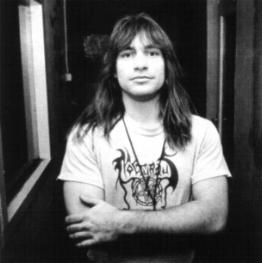 
Mike's drum roots are with Led Zeppelin, Black Sabbath, Emerson,
Lake & Palmer and Yes. In high school he played snare in the
marching band and learned to read and write rhythms. Between '82
and '86 he played in Morbid Angel. Slayer and Angelwitch are the
main reasons for making music as heavy as lead. With Nocturnus,
for the first time Mike can get rid of all of his ideas, whether
it's about singing, song writing, or drumming. Striking on "The
Key" are the small (6", 8" and 10") toms emerging
in his breaks. Seldom in music where it's usually low, lower,
lowest.
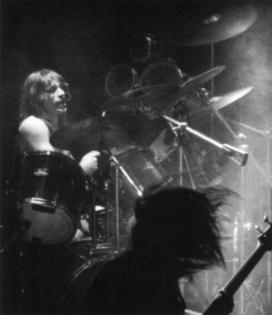 
"Yeah, I've always loved Neil Peart and he uses them often,
that's why. My kit goes from a 6" to 16" with a 24"
bass drum which gives me a lot of melodic possibilities in fills
and some rhythms. Nocturnus usually works from out of the guitar
riff or somethimes even from out of a certain sphere. Like with
"Neolithic". That had to sound prehistoric. We try to
catch this with riffs and rhythms. Tommy Aldridge was the one
that inspired me to go play with a double bass drum. If you want
to learn about playing steady you should listen to Tommy; or,
even better, go and watch him. But what I really like lately is
Watchtower and Rick Colaluca. I would love to have some private
lessons from him..... Unfortunately I still have a day time job.
But if I ever would be able to live off Nocturnus then I hope
to spend three hours a day on the band and three hours a day on
practising for myself. To study 6 months at the Percussion Institute
Of Technology in California also is a nice thought. If you don't
keep up your writing and reading it'll go."
RICK
COLACUCA
A band that clearly
left their traces on the metal world is Watchtower from Texas.
What you hear on the albums "Energetic Disassembly"
and "Control and Resistance" is a mix of thrash metal,
fusion, and avant garde jazz. The trio Ron Jarzombek (guitar),
Doug Keyser (bass) and Rick Colaluca (drums) are pushing the limits
so far in their rhythmical and melodic experiments that it's no
wonder that the singing gets in a crush and not one singer sticks
it out very long with the band. It's quiet around the band lately,
but their influence shows through in recent work of bands like
Confessor, Secrecy, Donor and Osiris.
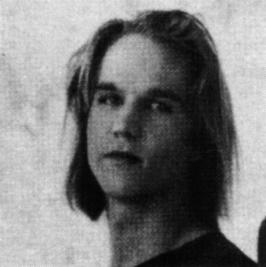 
"We don't have a song writing formula, but we are completely
devoted to our fans", tells Rick. "We therefore
want to keep the balance between technical and accessible. We
could write songs that would go so far that people without a profound
knowledge of music would not be able to follow anymore. That's
why we throw ideas overboard which we like very much ourselves.
I think half of the music I listen to is fusion and funk. My favorite
drummers used to be Neil Peart and Terry Bozzio, but nowadays
they are Weckl, Chambers, and Chad Wackerman. Of course there
are great thrash and rock drummers, but I'm inclined towards fusion.
Is anybody doubting the influence of Rush and Neil Peart? I want
to say that although it's probably the only band Ron, Doug, and
I like, all three, we are not trying to be Rush. Some people say
so. If you look at the trio concept and the progressive song writing
with the emphasis on technique you could draw a parallel, but
there are quite some early metal influences as well. After all,
we started as a cover band. We played Judas Priest, Saxon, Scorpions,
Iron Maiden and slowly more technical material crept into our
repertoire. When I rehearse I do everything I like. I actually
can't study rudiments very disciplined for hours. In high school
I walked in the front row of the marching band and learned a lot
about writing, reading and counting, but practising? Not really.
I really started to work on my basics when we were starting to
get recognition with Watchtower and got an audience that came
to watch us because of the technical tour de forces we did."
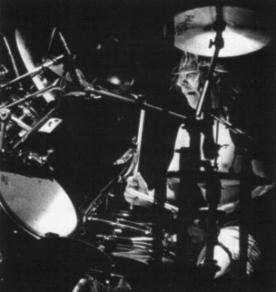 
WALLET
"I am not counting
when I play. Neither would I learn a break by heart or play a
certain accent everytime on the same place. I always know at which
point in the song I am, no matter how much improvising is going
on. What is to be heard on the last album is just a snapshot and
what I play live has little to do with it anymore."
Rick plays an acoustic drum kit, but his favorite set is a combination
of an acoustic snare and Yamaha electronics and pads (5 tomsounds
and special effects and 2 bass pads). Besides preferably small
cymbals: 14" and 16" crashes, 20" ride, 10"
splash and an LP Icebell.
"Of course I am
looking for a good deal because the kit I use now is based more
on price than quality. I mean, I'd rather use Drum Workshop pedals
than the Tama Flexaflyers I use now, but.... my wallet...."
Mark van Schaik
|



